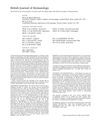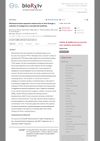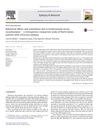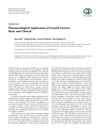2 citations,
July 2021 in “The journal of investigative dermatology/Journal of investigative dermatology” Sex hormones likely don't affect atopic dermatitis in adolescents and adults.
[object Object]  39 citations,
March 2003 in “The Veterinary clinics of North America. Small animal practice/Veterinary clinics of North America. Small animal practice”
39 citations,
March 2003 in “The Veterinary clinics of North America. Small animal practice/Veterinary clinics of North America. Small animal practice” Behavioral dermatology treats skin problems by considering both emotional and physical factors.
 5 citations,
September 2021 in “Cureus”
5 citations,
September 2021 in “Cureus” Depression in women with Polycystic Ovarian Syndrome (PCOS) is linked to insulin resistance and hyperandrogenism, and managing these can help reduce depression. Lifestyle changes and Cognitive Behavioral Therapy can be effective treatments.
 April 2016 in “Journal of The American Academy of Dermatology”
April 2016 in “Journal of The American Academy of Dermatology” Different treatments are effective for hair loss conditions, but results vary by individual factors.
 6 citations,
May 1993 in “Archives of Disease in Childhood”
6 citations,
May 1993 in “Archives of Disease in Childhood” Children's hair loss can be caused by many factors, including autoimmune diseases, emotional stress, genetics, and infections, with treatment and prognosis varying.
 1 citations,
May 2016 in “Current Opinion in Pediatrics”
1 citations,
May 2016 in “Current Opinion in Pediatrics” Children's hair loss can be caused by various factors and should be treated with appropriate, age-specific methods and psychological support.
 9 citations,
February 2016 in “Cambridge University Press eBooks”
9 citations,
February 2016 in “Cambridge University Press eBooks” The conclusion is that self-concept, shame, and emotion regulation are key factors in hoarding disorder, body dysmorphic disorder, and trichotillomania, and should be targeted in treatment and research.
 356 citations,
September 2014 in “Journal of Clinical Research in Pediatric Endocrinology”
356 citations,
September 2014 in “Journal of Clinical Research in Pediatric Endocrinology” Childhood obesity is rising globally due to various factors, and early prevention and healthy lifestyle changes are crucial.
229 citations,
March 2001 in “European journal of endocrinology” Testosterone levels influence male behaviors and physical traits, but this relationship is complex and influenced by both internal and external factors.
 41 citations,
March 2010 in “Psychology Research and Behavior Management”
41 citations,
March 2010 in “Psychology Research and Behavior Management” Using psychological treatments can help manage skin conditions along with regular medical care.
 28 citations,
January 2015 in “Skin appendage disorders”
28 citations,
January 2015 in “Skin appendage disorders” Children with trichotillomania often pull hair from their scalp, and parents may not notice; stress can trigger it, and asking detailed questions helps in diagnosis and treatment.
 18 citations,
November 2000 in “British Journal of Dermatology”
18 citations,
November 2000 in “British Journal of Dermatology” Many skin patients have mental health issues, so dermatologists should consider psychological care.
 237 citations,
January 2010 in “The Journal of Sexual Medicine”
237 citations,
January 2010 in “The Journal of Sexual Medicine” The report recommends personalized treatment for women's sexual dysfunctions and more research on effective therapies.
August 2021 in “Oxford University Press eBooks” New treatments for hair-pulling disorder focus on personalized approaches and combining therapies for better results.
 January 2017 in “International journal of science and research”
January 2017 in “International journal of science and research” Trichotillomania is a chronic hair-pulling disorder, more common in females, treated with therapy and sometimes medication.
 July 2023 in “bioRxiv (Cold Spring Harbor Laboratory)”
July 2023 in “bioRxiv (Cold Spring Harbor Laboratory)” Seeing trauma causes fear in mice by lowering their natural fear-reducing hormones.
 115 citations,
November 2015 in “The journal of allergy and clinical immunology/Journal of allergy and clinical immunology/The journal of allergy and clinical immunology”
115 citations,
November 2015 in “The journal of allergy and clinical immunology/Journal of allergy and clinical immunology/The journal of allergy and clinical immunology” Children with atopic dermatitis often have sleep problems, affecting their growth and behavior.
37 citations,
January 2003 in “Journal of the European Academy of Dermatology and Venereology” Turner's syndrome may be linked to autoimmune diseases like psoriasis and alopecia areata, needing comprehensive care.
 November 2024 in “Frontiers in Medicine”
November 2024 in “Frontiers in Medicine” Cirrhosis affects quality of life with various symptoms, requiring a holistic, multidisciplinary approach for management.
 December 2022 in “International Journal of Current Science Research and Review”
December 2022 in “International Journal of Current Science Research and Review” Polycystic Ovary Syndrome (PCOS) is a common but often undiagnosed disorder in women that can cause irregular periods, infertility, and other symptoms, and can be managed with lifestyle changes, medication, and sometimes surgery.
 June 2022 in “Veterinary evidence”
June 2022 in “Veterinary evidence” Clomipramine alone does not reduce overgrooming in cats with psychogenic alopecia.
August 2018 in “Archives on veterinary science and technology” Hair loss in lab macaques is not always due to neglect and has multiple causes.
 81 citations,
January 2011 in “European Journal of Internal Medicine”
81 citations,
January 2011 in “European Journal of Internal Medicine” Despite progress, better treatments and understanding are needed for the high rates of long-term issues and deaths linked to eating disorders.
40 citations,
May 1999 in “International Journal of Dermatology” Early diagnosis and treatment are crucial to prevent permanent hair loss from scalp trauma.
 284 citations,
February 2008 in “Pediatrics”
284 citations,
February 2008 in “Pediatrics” Chemicals and body size might change when puberty starts and progresses, but more research is needed to confirm this.
 47 citations,
May 2020 in “Cardiovascular Research”
47 citations,
May 2020 in “Cardiovascular Research” The document concludes that future heart disease research should account for sex-specific differences to improve diagnosis, treatment, and outcomes.
[object Object]  37 citations,
April 2013 in “Plastic and Reconstructive Surgery”
37 citations,
April 2013 in “Plastic and Reconstructive Surgery” Genetic and environmental factors, like smoking and exercise, affect male hair loss.
 17 citations,
July 2017 in “International Journal of Behavioral Medicine”
17 citations,
July 2017 in “International Journal of Behavioral Medicine” The Egyptian Arabic Skindex-16 is a reliable way to measure how skin diseases affect quality of life in Egyptian patients.
 10 citations,
October 2016 in “Epilepsy & behavior”
10 citations,
October 2016 in “Epilepsy & behavior” Levetiracetam often causes behavioral issues, while oxcarbazepine is more likely to cause sleepiness in epilepsy patients.
 2 citations,
January 2015 in “BioMed Research International”
2 citations,
January 2015 in “BioMed Research International” Growth factor treatments are increasingly used in medicine but require more research to fully understand their mechanisms.























